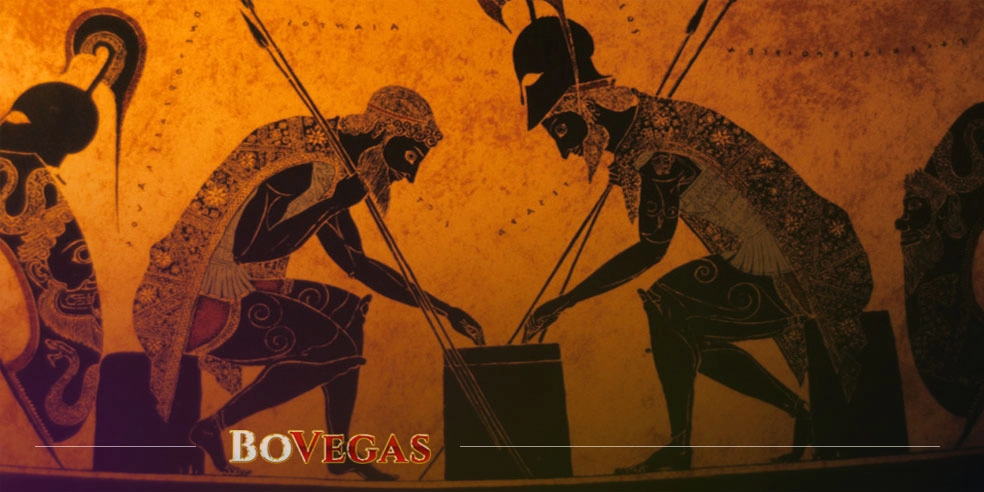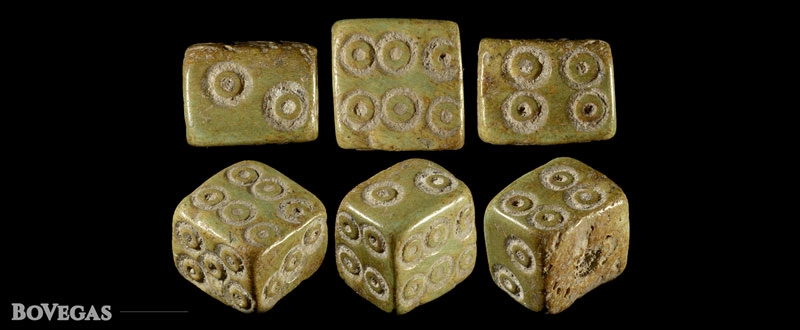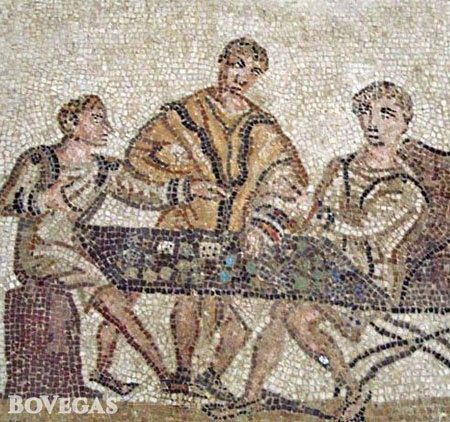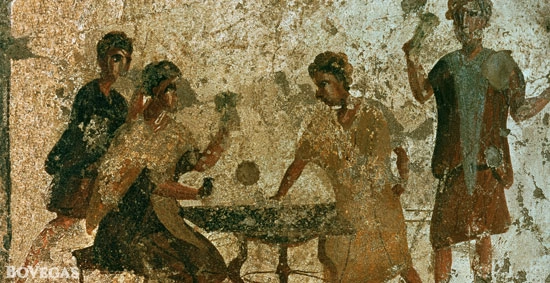



Today, gambling is mostly associated with either entertainment or with objective, emotionless analysis. Some people believe they can tip the odds with the help of their intellectual skills, while others rely on luck and faith in a successful outcome.
However, not so many of us assume that gambling is almost as old as the world itself. And of course, throughout the centuries, it has been a much more meaningful phenomenon than some might assume. Historically speaking, it’s not just some thrill-seeking activity that people do purely for the sake of their own amusement.
The oldest archeological finds of gambling items date back to Mesopotamia, 3000 – 1000 years BC. Presumably, the first-ever forms of gambling emerged as part of the ritual activities conducted in ancient shrines. The random outcome of sticks and stones were thrown on the surface was associated with the unforeseeable will of the gods. So as people watched the constant change of days and nights, seasons, life cycles, they related all these to the concept of the ever-spinning wheel. Nobody is able to escape this perpetual motion, nor can they control it. Although, what humans can do is to decide how to turn the vicissitudes of fate to their best advantage.
One early Scandinavian myth tells a story of how the gods played some games of chance to choose the paths of mortals as if the divine rulers themselves entrusted the sophisticated balance of the Universe to the windmill of fate. Therefore, the little dice becomes a symbol of those universal powers. By the way, the word “dice” originally comes from “datus,” which means “given” in Latin.

Supposedly, the modern games of chance were originally methods of guessing the future practiced by priests and fortune-tellers. Afterward, it moved from temples to royal palaces, and then to officials, merchants, and warriors, and finally, to the streets. For many ancient warriors, gambling games were recreational practices, which also trained their minds to perform a risk-taking behavior on a battlefield. For many other people, such games were a reminder that they should rely on the higher order of things, while also knowing the good measure for every action (as opposed to the careless spending of their resources).
 The ancient Roman festival called Saturnalia was dedicated to Saturn, the god of abundance and wealth. During this holiday, everyone was allowed to do what was frowned upon for the rest of the year. Namely, that was excess drinking and eating, partying non-stop, changing roles between masters and slaves. Of course, gambling was a great part of the fun, with nuts and coins being the stakes in dice-like games, as well as many other types of board games.
The ancient Roman festival called Saturnalia was dedicated to Saturn, the god of abundance and wealth. During this holiday, everyone was allowed to do what was frowned upon for the rest of the year. Namely, that was excess drinking and eating, partying non-stop, changing roles between masters and slaves. Of course, gambling was a great part of the fun, with nuts and coins being the stakes in dice-like games, as well as many other types of board games.
Interestingly enough, gambling was popular among all classes of society. This being so, the written record says that Emperor Augustus suffered from a severe gambling addiction. What’s more, during festivals like Saturnalia and Bona Dea, there was no gender preference. Women from all levels of society were allowed to gamble.
Gambling in ancient Rome was generally forbidden after some period of time; betting activity was only allowed in private homes and special places like taverns. Simple dice-only games were also complemented by dice-and-board games where objects were moved along the board, while the number of “steps” was decided by throwing dice.
Another game of chance was played with knucklebones. The players had to throw four knucklebones with values of 1, 3, 4, 6. The best combination (all 6) was named after Venus. The lowest value (all 1) was named after the Dog.
China has given the world a lot of captivating games like Mahjong, Wei-Qi, Xuan He Pai (analog of Dominos), and Yue Har Hai. And as the old findings show, they are also likely to be the first who invented card games; partly thanks to the invention of paper. The oldest cards ever found in China belong to the Tang dynasty, 9th century AC (618–907). Unfortunately, the rules of the first-ever card games are lost by now; but the tradition of playing face-value cards continued, later transforming into European decks with their Kings, Queens, and Jacks. Perhaps, just like the game of Go (one of the skills examined for bureaucratic positions, along with calligraphy and playing music) card games required a solid level of strategic thinking.
Ancient Chinese players also used porcelain chips to measure the value of stakes when playing such games. And one game that involved gambling activity was the oldest variation of Keno, which was invented in China more than 4,000 years ago. The game included a piece of paper with Chinese hieroglyphs painted on it. Players made their stakes, and then winning symbols were chosen by lot. Some historians believe that this hugely popular game was employed by the Han Dynasty to collect taxes in a more subtle and indirect manner than simply asking people to pay up!
As of now, gambling is officially banned across China, although official government lotteries are still allowed. On the other hand, Hong Kong and Macau have become iconic locations for people who want to place some bets.
The ancient Greeks were yet another civilization that believed that games of chance had been given to them by the gods. The myth tells us that the most high-rolling players, i.e., Zeus, Poseidon and Hades, drew straws in order to divide the Universe into three domains of rulership. Obviously, Zeus got the best variant, which was the skies. Poseidon got the seas; while Hades drew the short straw, which was for the underworld. Another myth says that patronage over Athens was won by a bet between Athena and Poseidon. The latter lost the bet, and afterward cursed the city, so they would never have enough water for their needs.

The Greeks have been known as avid gamblers since the dawn of time. Apart from betting on animal fights, which was what everyone liked the most, people from all different social backgrounds also enjoyed spending their time playing checkers and dice.
Yet, the ancient Greeks are now famous thanks to another gambling invention that is very popular across the world today. It’s the easiest game of chance of all, that so many of us have been familiar with ever since childhood – Heads and Tails! At first, they played it with little shells; but then the game evolved into the one we all know today, which uses a coin instead.
There was a really exciting archeological discovery in Utah: a cave that belonged to Native Americans. The unusual thing about this cave is that it had nearly 10,000 objects related to gambling. So, was this the first-ever casino in history? So far, we simply don’t know.
Historians say that native Americans used games of chance for routine purposes. So if your family wanted to divide up your duties for today – who cooks the food, who goes hunting, who washes clothes, etc, you would throw the dice and then decide it all randomly. Also, there is evidence that gambling activities were mainly practiced by women. At the same time, relying on chance was closely associated with fortune-telling and spiritual practices more generally.
So as you can see, sometimes gambling can be seen from a deeper perspective than usual if you take into consideration its deep roots. And it’s also worth thinking about why it has remained so popular for thousands of years? You could also view gambling as a kind of brain-training, to help you keep your mind sharp while having some fun at the same time! And beyond that, it’s also about developing a sophisticated skill of intelligent risk-taking, while also being psychologically prepared for the fact that the game is just a smaller model of what happens in the real world! After all, it all boils down to what life really is all about, in the end: the art of taking the best route under unpredictable circumstances.

When you imagine your perfect getaway, the last thing that pops into your head is an image of drunk and drug-infused tourists, prostitutes, pimps, and people who are losing their heads over a huge loss in blackjack. Nevertheless, casino destinations are not all about vice and permissiveness. The owners of most casinos have made sure […]
This question is as old as gambling itself. Players have been pondering it since ancient times. Tons of books have been written, theories developed, and practices tested. On top of having fun and enjoying the experience, players have always wanted to succeed as well! And this is quite natural, as everybody who is starting off […]
People gamble for both pleasure and financial gain. Gambling is a form of entertainment with the possibility to get big winnings. Therefore, it’s best to be prepared for receiving prizes from casinos and know how financial operations work. The best online casinos for real money give customers the chance to test any game for free. […]
You can’t just have enjoyed some kind of unrestrained privileges at an online casino. There are certain restrictions and rules each online “establishment” implements, with the aim of maintaining order and compliance among its online patrons. Normally, the rule mechanisms, as well as the various specific regulations that online casinos apply, are quite similar. And […]
If you love gambling and have been to a land-based casino at least once, you may have thought about becoming a dealer. Playing the same game but from the opposite side, while communicating with other players, sounds like a dream job, right? A dealer is a straightforward job, and you will be the heart and […]
On Monday September 14, MGM announced that it plans to open its first smoke-free casino at the end of September, when Park MGM will finally reopen its venues to players and tourists. The resort comprises around 2,990 rooms and various restaurants, and it’s set to be reopened on September 30. The venue has been closed […]
Online gambling has undoubtedly taken a place of true supremacy over the casino industry during the pandemic. And the reason for that is quite clear: online casinos are more accessible, and you can always count on some encouragement from the casino administration to help you boost your game. However, this digital revolution has only been […]
The large selection of online gambling sites out there can make players somewhat puzzled, and give them a feeling of uncertainty about making the right choice of casino. Each online gambling venue offers its own conditions, games, and various bonuses, of course; but the most important thing is the reliability of the casino and the […]